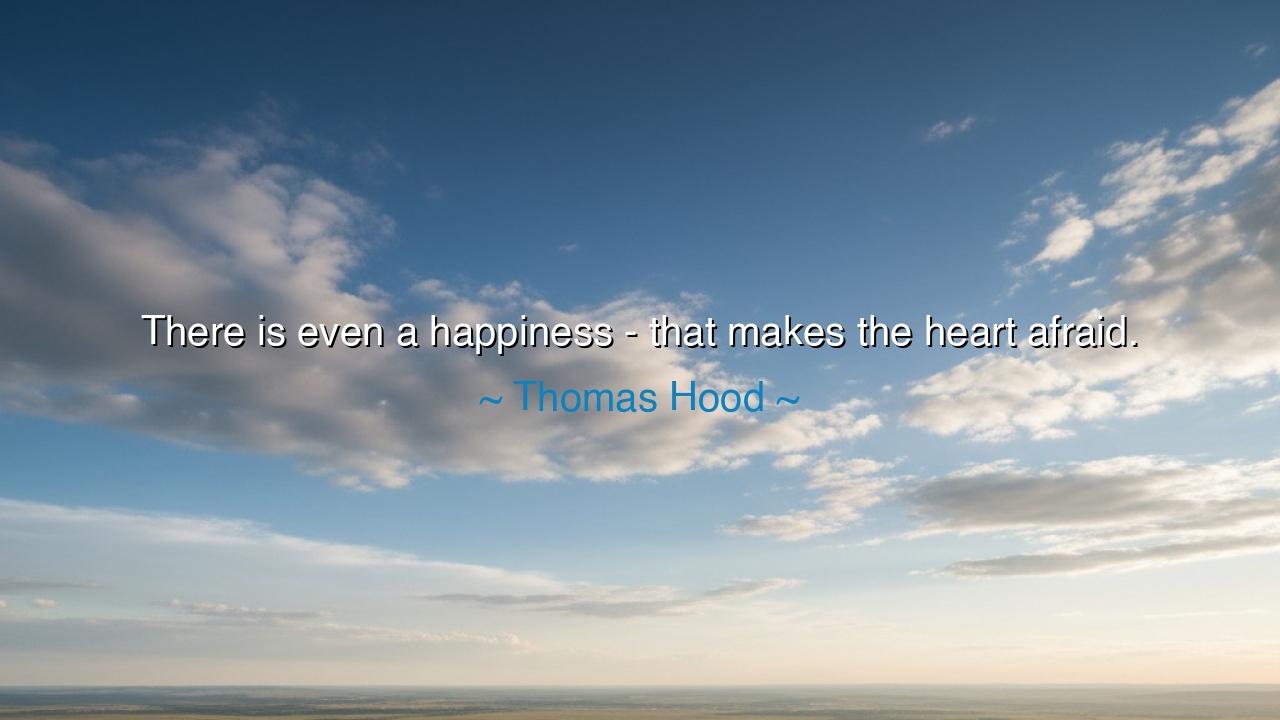
There is even a happiness - that makes the heart afraid.






The English poet Thomas Hood, whose heart was both tender and wise, once wrote: “There is even a happiness — that makes the heart afraid.” These words, soft as sighs and heavy as fate, capture a truth that lives deep within the soul of all who have ever loved, hoped, or dreamed. For Hood speaks not of ordinary joy — not the fleeting delight of pleasure — but of that profound and trembling happiness which comes so near to perfection that it awakens the fear of losing it. It is the joy so bright that it casts a shadow, the peace so complete that the heart, knowing its own frailty, begins to tremble at its beauty.
The origin of this quote lies in Hood’s poetic reflections on the fragile nature of human emotion. A man of deep feeling and quiet melancholy, he knew well that life gives no joy without also holding the power to take it away. He lived in an age when sorrow was familiar and hardship constant — yet it was in this tension between rapture and ruin that he found his poetry. When he wrote of a “happiness that makes the heart afraid,” he was naming that bittersweet truth known to every soul that has glimpsed something too precious for words — love that feels eternal, peace that feels undeserved, joy that feels too fragile to last. His was the wisdom of a man who understood that all earthly beauty is bound by time, and that the heart, in recognizing this, both rejoices and trembles at once.
There is, in truth, a strange kinship between happiness and fear. The ancients spoke of it in their myths: when joy reaches its height, fate begins to stir. The Greeks called it hubris to dwell too long in delight, as if the gods themselves were jealous of mortal bliss. But Hood’s meaning is gentler, more human — he does not warn against joy, but acknowledges the soul’s awe before it. To be truly happy is to stand at the edge of the infinite, to feel how small we are before the immensity of life’s blessings. And so the heart, knowing the cost of love and the certainty of change, trembles in its gratitude. It is not cowardice but reverence that makes it afraid.
History too bears witness to this paradox. Consider Anne Frank, who in the darkness of her hiding place, wrote in her diary, “I don’t think of all the misery, but of the beauty that still remains.” Even in peril, she allowed herself moments of happiness — yet that joy was edged with fear, for it existed in defiance of sorrow. To smile while the world collapses is an act of courage, but also one of trembling vulnerability. So too was Hood’s reflection: that happiness is not always loud or careless; sometimes it is quiet, almost sacred, tinged with the ache of knowing it cannot last.
There is also a more personal lesson hidden within these words — a lesson about acceptance. Many people, upon feeling great happiness, begin to pull away from it, as if fearing the punishment of loss. They whisper, “This is too good to be true,” and in their fear, they spoil the moment themselves. Yet Hood reminds us that this fear is not a flaw, but a sign of depth. To be “afraid” of happiness is to understand its value — to know that what is most beautiful is also most fleeting. The wise heart learns not to reject such happiness, but to cherish it all the more tenderly for its fragility.
We might recall the story of the samurai poets of Japan, who, at the height of spring, would compose verses to the cherry blossoms — symbols of life’s perfection and impermanence. Their beauty was breathtaking, and yet every petal that fell reminded them of time’s passing. They loved them not in spite of their transience, but because of it. So too, the happiness that “makes the heart afraid” teaches us to live with open eyes — to love deeply even while knowing the world changes, to give thanks even when tomorrow is uncertain.
Therefore, let the heart not shrink from the happiness that frightens it. Let it feel both the joy and the trembling. For this is the highest state of being — to know love, and still love; to see the end, and still begin; to walk through the world not guarding the soul against pain, but opening it wide to wonder. The fear we feel in happiness is the soul’s way of bowing before the sacredness of the moment. It is saying, “This is real. This matters.” And that, perhaps, is the purest form of joy we can ever know.
So remember, as Thomas Hood taught: embrace even the happiness that makes your heart afraid. Let it humble you, let it teach you gratitude, let it remind you that life is precious because it passes. For only those who risk their hearts to joy — who dare to love though it may break them — truly live. Happiness is not meant to be held forever, but to be experienced fully, courageously, and with reverence for the fleeting miracle that it is.






AAdministratorAdministrator
Welcome, honored guests. Please leave a comment, we will respond soon